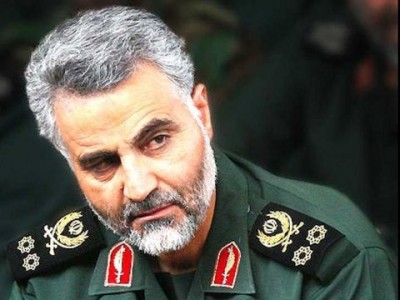
In early December UN monitors pointed out that there was substantial evidence of sanctions violations by Iran in Iraq, where the leader of the Iranian Revolutionary Guard Corps’ Quds Force was apparently operating with impunity in spite of a Security Council blacklist barring him from travelling to UN member states.
By the time of the report of the presence in Iraq of General Qasem Suleimani the Iranian regime had stopped even trying to conceal this violation. By the end of 2014 his contribution to Iran’s supposed fight against the Islamic State (IS) in Iraq had become a sort of PR windfall for the Islamic Republic of Iran. Photographs and videos of him on the Iraqi battlefield among Kurdish Peshmerga and Shiite militants were released in Iranian state media and Suleimani was almost exclusively given credit for military victories while the U.S.-led coalition’s air support was derided as ineffectual.
It is easy to imagine the reason for Suleimani’s sudden publicity was because the Iranian regime had concluded that the UN and its Western member states were unlikely to do anything to enforce the sanctions against the Quds Force commander, especially at a time when the U.S. president was sending secret letters to Iranian Supreme Leader Ali Khamenei urging cooperation between the two countries against the IS threat in Iraq and Syria. Whatever the earlier gamble it appears to have been justified by the lack of a serious response once the UN became aware of the visual record of Suleimani’s operations in Iraq.
But the reality is that the Quds Force, which Suleimani controls, is the foreign arm of the elite and politically powerful paramilitary force, the Iranian Revolutionary Guard Corps (IRGC). The Quds Force has been listed as a supporter of global terrorism by the European Union since 2011 and by the United States since 2007. By effectively ignoring last month’s report by the UN sanctions monitors, the UN member states have given the green light to military and political influence by a recognized terrorist leader. Where he goes, it can only be assumed that his fighting force will follow.
Indeed, the National Council of Resistance of Iran (NCRI) revealed, also in December, that a significant number of Quds Force operatives are present on the battlefield in Iraq, among them high ranking commanders, as evidenced by the recent combat death of IRGC Brigadier General Hamid Taqavi.
Denial is no longer relevant. Suleimani has been photographed in Iraq and Syria, as have Iranian bombers that conducted bombing raids against IS targets in Iraq. Not only is the West aware of this involvement but many experts have concluded that for such bombings to have taken place, there had to have been a significant measure of coordination and cooperation between Iran and the U.S.-led coalition operating in the skies over Iraq.
But then, it is quite clear that the West knew about Suleimani’s presence in Iraq at least as early as last June when an Iraqi official confirmed that the Iranian commander had taken control of the Iraqi army, and when a former CIA operative identified Suleimani as the most powerful operative in Iraq at the time.
Not only have the U.S., the EU, and the UN been ignoring the presence of a recognized terrorist group inside a supposedly allied country for the past month; they have been systematically ignoring it for much longer. This is at once a disturbing precedent for the current conflict and a disturbing reminder of past conflicts in which we’ve trusted dubious paramilitary forces, only to see them develop into the major threat sometime down the line.
Given the volume of anti-American rhetoric coming out of the Iranian regime even at a time when it is presumably coordinating militarily with Western powers, and its unabated nuclear ambition, it is very easy to imagine that we face a similar danger in this case.
The U.S. and some of its allies have been far too eager to assume that we are dealing with a kinder, gentler Iranian regime ever since the emergence of Hassan Rouhani as Iran’s president. But this assumption doesn’t mesh with the simple fact that Iran is still dispatching known terrorists into foreign territories, including not only Suleimani and his Quds Force but also various Shiite extremist groups including Lebanese Hezbollah, which has been spotted fighting for the Assad regime in Syria.
Whatever wishful thinking the West may foolishly cling to regarding political change in Iran, it is irresponsible for its policies toward the Islamic Republic not to be based on the realities on the ground – those photographs, videos and UN reports that indicate how Iran is flouting its obligations under international law and almost daring the West to confront it over these blatant violations.
Sure, doing so may spoil the dream of making friends with the Iranian regime by America’s detached policy-makers. But as it stands, that potential friendship looks like nothing more than ignoring Iranian regime’s animosity towards the West and turning the proverbial blind eye to all the dangerously illegal things it does. That is hardly a sound policy to address the current instability and crises in the Middle East that threaten the world peace.
Lord Maginnis of Drumglass is an independent member of the UK House of Lords and prominent member of the British Parliamentary Committee for Iran Freedom (BPCIF)
Daily caller

Leave a Reply
You must be logged in to post a comment.